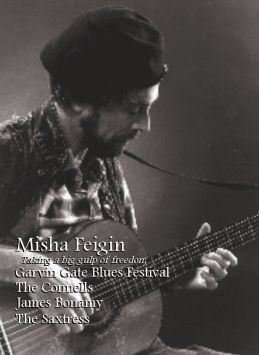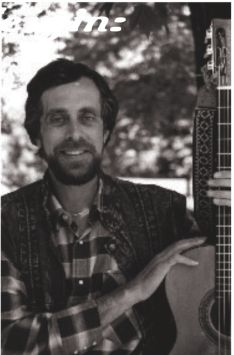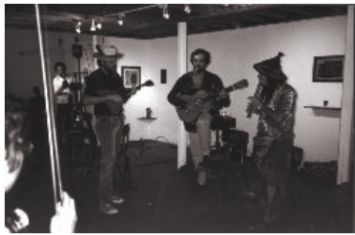social bookmarking tools:
 |
|
| Available RSS Feeds |
|---|
 - Top Picks - Top Picks |
 - Today's Music - Today's Music |
 - Editor's Blog - Editor's Blog
|
 - Articles - Articles
|
Add Louisville Music News' RSS Feed to Your Yahoo!
|

Misha Feigin: Enjoying a big 'Gulp of Freedom'
Six years ago, Misha Feigin departed his homeland Russia with nothing but $300, a suitcase, a backpack and a guitar.
He left behind family, friends and a burgeoning career in folk music, but he has never regretted his move to the United States. The trip was his first drink of freedom, and the thoughtful, intelligent Feigin has been slurping from that fountain ever since.
"If you'd ever taken that first drink of freedom you would never forget it and you would never go back," the lean, bearded man said.
Perhaps it is fitting (or maybe ironic) that his fourth and final album in Russia included the song "Gulp of Freedom," which Feigin wrote to express the sweet taste he longed for.
Either way, Feigin's move resulted not only in personal and political freedom, but musical freedom as well. He takes advantage of all three through solo shows - featuring Feigin's folk music along with his original poetry and prose backed by his tender guitar playing - plus numerous other musical and artistic projects as well.
Feigin recently appeared on a compact disc with a band called Ut Gret, a project headed by California transplant Joee Conroy. Feigin is also one half of an improvisational duo which performs under the name Neoscience. He met partner Dean Zigoris through Ut Gret.
Zigoris knows Feigin well enough to know he is "a bit of a world wanderer. He's probably seen more of the United States than most people and knows what it has to offer, especially its physical beauty."
Zigoris added, "That's part of his mode of life, having that mental freedom and physical freedom."

Yet while he continues to drink full from freedom's fountain - he's seen 47 states and has performed in Canada - Feigin has also put down roots in Louisville, purchasing a condominium just off Brownsboro Road.
Is Louisville where Feigin will finally take permanent root? At least two of his friends believe he will eventually move on, but for now at least Feigin seems to be content to return to Kentucky after each of his jaunts across the states.
The walls of Feigin's condominium bear photographs of his travels. Taken in states from Utah to Maine, images of forest paths, mountains, sunsets and streams turn the small dwelling into a giant pictorial account of his travels.
And while the pictures insinuate Feigin wishes he were somewhere else, he is never far from home.
"I think it's a great question: 'Where is home?'" he said.
Feigin believes home is more than a location, and compared the concept with a wagon:
"If you take the wheels off, is it still a wagon?" he said. "No."
Each person, he reasoned, has to decide what can be taken away from his or her life without diminishing that person's freedom and happiness. What cannot be removed is home.
"My music is my home, my friends are my home," Feigin said.
He tells the story in his song "Where the Home Is," which appeared on a compilation album by blues master Winston Hardy, another of Feigin's friends and contemporaries.
"It's my life story," said Feigin of the engaging folk tune.
Hardy admits he loves the song. While the compilation, "Rootless Cosmopolitan's Stories," was dominated by blues, he wanted Feigin to participate as well.
"He's a craftsman," Hardy said. "He's good. The man knows how to play music, and on top of that, he has something to say. ... And he is a great storyteller."

Hardy knows how much Feigin enjoys the freedom he finds in travel and music, but insists the musician-of-many-trades has also found another kind of freedom in his condominium.
"When he got his place he was like a kid with a new toy," Hardy said. "He really was happy ... (because) it was his place. It was kind of like an epiphany for him. A craving."
Unless you count the piano lessons he took from ages 6 to 9 (which he hated), Feigin first fell in love with music when he began playing guitar during his senior year in high school.
His interest became even more intense following college; he first appeared onstage with a rock 'n' roll band in Siberia. Primarily a singer, Feigin and his band performed songs by Jimi Hendrix, Grand Funk Railroad, Creedence and others.
"It was the beginning," he said.
American rock music was not, however, welcomed by the Russian government. So, his band - which did not have a name for obvious reasons - played "illegal" dance gigs and underground club shows.
"We played with no advertisement," Feigin said. "You weren't even supposed to sing in English."
Still, Feigin and his band persevered. Unfortunately, he and his compadres were unable to get good equipment because of financial reasons. This also meant people with money often found spots in bands, even if they had no talent.
"We had a good band and an extremely lousy drummer who bought all the equipment," Feigin said.
Feigin also bought and sold American rock 'n' roll on the black market. He and his friends would acquire records, record them on a home tape recorder and distribute the tapes.
"It all started spreading like wildfire when we got our tape recorders. They couldn't stop us after that."
After about three years, Feigin found his way into another band covering Deep Purple and Led Zeppelin songs. This band was actually a small part of a larger jazz/fusion combo which played regularly at a public cultural center.
The jazz artists were talented, Feigin said, but were also heavy drinkers. After they would get too drunk to play, Feigin and the band's rhythm section would take the stage and play rock 'n' roll.
"It was the best thing I did in rock 'n' roll," he said. He thought he was on a roll with this group until one night when a government official walked in while Feigin was singing "Whole Lotta Love." The little bald man threw him off the stage, ending his rock career for good.
"That was my swan song," he said.
Even if he'd wanted to join another rock band, Feigin said the government kept its eye on him and let him know it. He wasn't harmed nor was his family harassed, but subtle hints were clear enough.
"They let me know Big Brother was watching me."
Feigin began to attend evening music school, finishing a five-year course in four years studying classical guitar. He was still unable to get quality equipment so he decided to play acoustic, and he began to play what he terms "contemporary urban folk," music in the vein of Crosby, Stills and Nash.
He soon got into recording and in 1986 gave up his day job as an engineer to become a full-time touring musician.
By 1988, Feigin was hired by Russian folk star Jane Bicheuskaya and toured with her all over the USSR playing before crowds of up to 3,000. Feigin had his own solo set in the show.
"For me it was major training. It was scary but it was a great, great baptism."
It also made him a recognizable figure on the Russian music scene. "In that one year I made more money than I did for the rest of my life," he said.
Over the next two years Feigin did some recordings for Melodiya, Russia's only music label. He also appeared on most of the country's major TV and radio shows and filmed five video renditions of his folk songs.
"It's not like MTV but they were very well done" using multiple cameras, he said. The videos are still being played there.
His most popular song in Russia was one called "Ballad for Count Von Gleichen," a musical retelling of a story about a German knight who is rescued from slavery by an Arab girl, to whom he vows his loyalty. He was, however, married, putting a twist of bigamy into the story which Feigin had read in a history book.
"It produced quite an impact," he said of the song.
When 1990 arrived, he was more than ready to leave, despite his success. He had been thinking of leaving for many years; he craved freedom. Even as a child he dreamed of visiting far away lands:
"I wanted to be a world traveler when I was little. I was dreaming of different countries far, far away. I was deprived of this. Because of the fact I was hanging out with hippies playing in a rock 'n' roll band, I wasn't up to social standards. I was black-listed."
His dissatisfaction led to much of his "political activity" such as rock music and drugs. "I did inhale," he said. He laughed, eyes twinkling, then added, "But I quit it."
Life for those like him was much like the restless youth in the United States at the time. "Sex, drugs and rock 'n' roll," he said. The difference is that in Russia such behavior was seen as political activity.
"There, if you don't show your support for the government (by obeying the rules), you are against the government," he said. "I didn't show my support." He laughed again, the sparkle once again evident in his gentle eyes. Let freedom ring - and sing
Feigin's first release in America, a 1991 album, consisted of his final Russian release plus four songs produced in Kentucky. One of those songs was "Children of the Rainbow," which is his signature song in this country, much like "Ballad for Count Von Gleichen" and "Gulp of Freedom" in Russia.
"Children," written during the Los Angeles riots following the Rodney King trial, was played on a National Public Radio program and broadcast on more than 120 radio stations nationwide, "which did not translate into money, but did translate into happier living, which is much better," Feigin said.
The guitarist's musical interests have blossomed since his arrival in America. He has experimented with Medieval instruments and in 1995 recorded a blues album, not with an electric guitar but with a balalaika, a stringed instrument which is "considered the most distinctive Russian instrument," he said.
That album included the song "Delta 2," which helped land him a spot in the Winnipeg International Festival, where he opened for John Sebastian and Leo Kottke. He has also played at the prestigious "Womad" World Music Festival in Toronto and, last summer, in the Festival of Free Music in Birmingham, Ala.
He has shared the stage with the likes of Peter Yarrow of Peter, Paul and Mary, and with well-known New York composer and guitarist Elliot Sharp.
Last March, Feigin, accompanied by a guitarist and dancer, performed at the Kneading Factory in New York City, a club for free jazz and improvisational music.
"You don't make money playing there, but it was very nice to be on their bill," Feigin said. "It was kind of like a dream gig."
Feigin sings in both Russian and English and has an extensive knowledge of classical, Russian, Folk and Gypsy guitar styles. He even studied jazz for two years.
Conroy, a friend as well as co-performer in Ut Gret, said Feigin is similar to Paul Simon in that, no matter what type of music he might be playing, his signature sound comes through.
"His songwriting style is very similar," Conroy said.
Currently, along with his solo shows, Feigin is exploring improv with Neoscience and Ut Gret.
"I'm very happy with what we are doing," Feigin said of Neoscience, because it is almost 100 percent improvised. "We're trying to reestablish the connections between music and math. We do a kind of rhythmical juxtaposition."
Feigin points out that math and science are inherently romantic, connecting them with the arts. Scientific geniuses such as Albert Einstein and Sir Isaac Newton, he pointed out, "had all these big ideas."
"Misha's background is that of a folk artist," said Zigoris, "but he has a strong avant garde tradition. We take a textual approach; it's not the melodies, rhythm and harmonies necessarily, but how they change on an abstract level."
Feigin's role in the duo is guitar and lyrics, while Zigoris said he is more of an "electronic guitarist. I provide an electronic backdrop" for Misha's performance.
"He is a fantastic guitar player," Zigoris continued. "He has great technique. I'm learning, let's put it that way. It's been constructive."
If it's been a learning experience for Zigoris, it has been another thirst-quenching drink for Feigin, who said the improv in Neoscience works well because "you're free to be harmonious, you're free to be melodic." An American citizen.
Feigin became a citizen of the United States Oct. 16. His only regret: He missed registration and couldn't vote in the presidential election.
"But I will be voting all the rest. Because I am here, I need to participate."
That is Feigin's way. He relishes the fact he can take part in deciding government leadership, and he is quick to criticize the government, a practice not accepted in his homeland.
"Of course I was not happy with our political situation (in Russia)," he said, "but I came here and found it to be much the same: lots of lies and bureaucracy. ... I didn't expect it to be perfect, but when I came here it was a little less perfect than I expected. But it's better."
Better because he has the freedom to pursue whatever goal he wishes, to play whatever music he desires. When something comes so naturally as music does to Feigin, that kind of expression is a must.
"Music was never a goal in my life, but it was a part me," Feigin explained. "Like you have ears and fingers, I consider it a part of my being."
For that reason, he doesn't crave commercial success. Feigin doesn't mind fame, but he also doesn't pursue it specifically. He only wants to play his music and make a sufficient living.
"I'm happy where I am; I don't have many things, but it's enough.
"I think excessive money, real excessive money, depraves people. I think it's a great challenge to be rich and still be an honest, caring person. And to become rich, you have to crush so many bones, break so many skulls to get it," Feigin said.
His artistic successes are "enough for my vanity," he concluded.
More important to Feigin is his freedom to pursue whatever artistic activity he chooses, whether it be his poetry and prose, his folk or improv music, photography or even the collages he creates from time to time.
Even down time is beneficial, Feigin believes. "For an artist, there is no time wasted."
Whether a person is sitting, looking out the window or merely scratching his or her head, all this "is part of life. All this can be used in the creative experience."
And Feigin's creative endeavors are all about one thing: communication. He bemoans the fact that so many people live their individual lives without communicating with others. He believes firmly that a group of individuals living near each other is not a community unless they interact.
"We need to protect individual rights," he said. "It's what the American forefathers intended. Socialism or Marxism is intended to creat a community" but only squelches individuality.
"I believe there is a balance. If one or the other is controlling, it is very bad."
"Reaching out to other people to me is one of the things about being human, and art is a great opportunity to reach other people. I'm always looking for new channels through which to communicate."
SIDEBAR
Misha Feigin will perform Nov. 16 at Barnes & Noble Booksellers on Hurstbourne Parkway, and again Dec. 6 at the opening of a new Hawley-Cooke Bookstore at Glenview Point.
Feigin has several different shows and presentations. They are:
- "Moscow on Ohio:" A selection of original songs and stories in Russian and English.
- "Guitars on Fire:" A program of Russian traditional and contemporary city romance and gypsy music.
- "Notes From the Underground:" Dialogue about life in Soviet rock 'n' roll, hippie and cultural underground in the 1960s and '70s. Songs include Russian originals and rock classics such as the Beatles, Rolling Stones, Bob Dylan, Jimi Hendrix, Neil Young, etc.
- "Spontaneous Folks Music:" A performance of free, improvised singing, poetry and music on guitar, balalaika and berimbau.
- "From Troubadours to the Beatles:" A concert-lecture about singing poets and ballads from the Middle Ages to the present; the place of ballads in contemporary rock and folk music; folk singers in Russia today.
